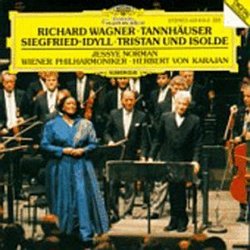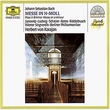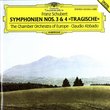| All Artists: Richard [Classical] Wagner, Herbert von Karajan, Vienna Philharmonic Orchestra, Jessye Norman Title: Wagner: Tannhäuser/Siegfried-Idyll/Tristan und Isolde Members Wishing: 0 Total Copies: 0 Label: Deutsche Grammophon Release Date: 10/25/1990 Genre: Classical Styles: Opera & Classical Vocal, Forms & Genres, Symphonies, Historical Periods, Modern, 20th, & 21st Century Number of Discs: 1 SwapaCD Credits: 1 UPC: 028942361324 |
Search - Richard [Classical] Wagner, Herbert von Karajan, Vienna Philharmonic Orchestra :: Wagner: Tannhäuser/Siegfried-Idyll/Tristan und Isolde
 | Richard [Classical] Wagner, Herbert von Karajan, Vienna Philharmonic Orchestra Wagner: Tannhäuser/Siegfried-Idyll/Tristan und Isolde Genre: Classical
Karajan's appearance with Jessye Norman and the Vienna Philharmonic at the 1987 Salzburg Festival produced one of the great Wagner discs of all time, capped by a seething, compelling, white hot realization of the "Liebesto... more » |
Larger Image |
CD DetailsSynopsis
Amazon.com essential recording Karajan's appearance with Jessye Norman and the Vienna Philharmonic at the 1987 Salzburg Festival produced one of the great Wagner discs of all time, capped by a seething, compelling, white hot realization of the "Liebestod." Karajan knew he had something here, and listening to the performance is likely to leave you weak in the knees. As the account unfolds, everybody's on the edge of their seat--Norman comes in just that way, not sure of what volume to give it, halting, momentarily unsteady; then she cuts everything loose. Her singing is agitated and emotional, practically orgasmic if one must characterize it accurately. But Karajan has the last word, and it is a minute and 12 seconds of the most rapturous playing imaginable, a meditation on the opera's final word ("Lust") and the whole meaning of Tristan und Isolde. This was the payoff for an entire career spent in pursuit of the refinement of orchestral sound. On the same CD, Karajan presides over perhaps the best Siegfried Idyll on record, a lovely, spacious reading full of gentleness and radiance. The piece is exquisitely played by the VPO--very much as they did for Karajan in those final years, communing with him as much as performing the music for us. --Ted Libbey Similar CDs
|
CD ReviewsOne of Karajan's finest achievements cdsullivan@massed.net | Cambridge, MA USA | 12/27/2001 (5 out of 5 stars) "This outstanding recording of Wagner selections was made live at the 1987 Salzburg Festival. It certainly captured Karajan at his best. He is quite fabulous here; of course, he draws a glorious sound from the Vienna Philharmonic on top form, but here he is also infallible of pacing, and expressive and insightful of interpretation. This is one of his warmest recordings I know of. He is letting himself get caught up in the music, as he sometimes didn't.The opening Tannhäuser Overture is nobler in the pilgrims' theme, more sensuous in the Venusberg music, more singing in Tannhäuser's song than any other recording. It is a magnificent performance. The only drawback I can find is that in the more energetic sections of the Venusberg music, Karajan sounds a little heavyweight: not as wild and fleet as Solti. In all other respects, though, this is an incredible performance, and makes you regret again that he never made a legitimate recording of the complete opera.The Siegfried Idyll is, if anything, even more extraordinary. It is warmest performance I know, unfolding gently and sweetly in a glorious, beautifully rich carpet of sound from the Vienna forces. It is also helped by the clarity and transparency of the magnificent digital recording. It is an ideal reading, and alone is worth the price of the set.The Tristan excerpts are also on this level. The Act 1 Prelude is magnificent. Emotion is conveyed more clearly than in Karajan's 1971 complete recording, and there is an added clarity of sound and orchestral texture. It is as fine a recording as any, and on the same level as (though very different in style from) Furtwängler's 1952 EMI recording. The Liebestod is gorgeous, one of the two or three greatest recordings of this stunning piece ever made. Jessye Norman is a glorious soloist, with her large, magnificently beautiful voice riding the waves of orchestral sound in a way few can. The climax is stunning, and dies away into rapturous lyricism from Karajan and the Vienna Philharmonic. The only other recordings I think are on this level are the 1952 Furtwängler/Flagstad and the 1971 Karajan/Dernesch. Comparison between the 1971 and 1987 Karajan versions is particularly interesting. The 1971 account is, strangely, more electric and intense, with Dernesch providing both a more beautiful, truly Wagnerian voice and singing more expressively than Norman. The climax at "In der Welt-Atems wehendem All" is the most shatteringly ecstatic on any recording. The 1987 recording is clearer and perhaps even more beautiful than the earlier account, but not as intense. Inevitably, more detail can be heard in the digital recording. Both are fabulous recordings, however; though in some ways the Furtwängler/Flagstad is the finest of all.Overall, this is one of the finest recordings in recent memory. In my opinion, this is one of Karajan's finest recorded achievements and one that deserves to be in every collection of Wagner. Enjoy!" Great performances, for the most part E. A. Lovitt | 10/11/2002 (3 out of 5 stars) "The Overture to Act I of Tannhaeuser is played with great feeling and precision, and at just the right tempi. The cello section is extremely expressive. However, the horns can hardly be heard--a big loss in this piece. The Siegfried-Idyll is also very well played--perfect conducting and execution.The Act I Prelude to Tristan und Isolde starts out tentatively and seems unfocused, but gets better.While I really like the rich tone of Jessye Norman's voice (and her emotive capacity), I don't care for other aspects of her singing of the Liebestod. She doesn't pronounce a lot of consonants, she swallows many words, and has difficulty controlling the volume of her high notes. But what really bothers me are the extra notes she throws in--especially on "Wonne klagend". She turns the melody into a bluesy major pentatonic run. This sticks out like a sore thumb--not exactly idiomatic. Of course, it might not matter to the listener who hasn't heard other versions of the piece, or who likes a little Porgy and Bess with their Tristan and Isolde." Love and Death: Wagner, Von Karajan, Norman E. A. Lovitt | Gladwin, MI USA | 06/18/2001 (5 out of 5 stars) "I saw part of the film "Karajan in Salzburg" on PBS about ten years ago. I was channel surfing and happened across Jessye Norman singing "Isoldes Liebestod" (the last track on this CD). I wasn't that familiar with Wagner at the time, had just worked my way through the Met's Ring Cycle, and had no notion of what Norman was singing. I couldn't understand her German. Yet I could feel the hair rising up on the back of my neck. By the time she had finished, I was crying.That brief seven minute film clip was an epiphany for me. I fell desperately in love with Richard Wagner and Jessye Norman (Von Karajan was no slouch, either). I was elated when I came across this Deutsche Grammophon recording that was made during the filming of "Karajan in Salzburg." These four exerpts from "Tannhauser," "Sigfried," and "Tristan und Isolde" are Wagner at his most sublime. The climax is Norman's clear, tender 'Liebestod':"Do I alone/ hear this melody/ which, so wondrous/ and tender/ in its blissful lament,/ all-revealing,/ gently pardoning,/ sounding from him,/ pierces me through...""
|

 Track Listings (4) - Disc #1
Track Listings (4) - Disc #1

